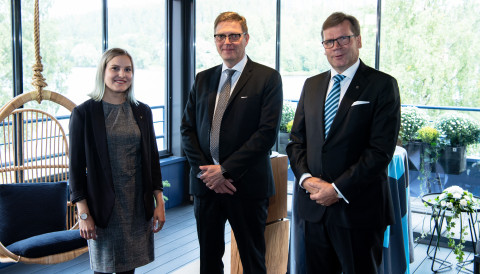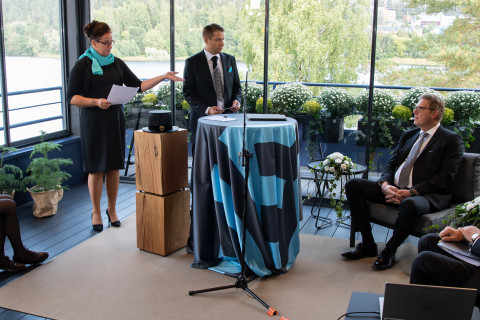“Research is expected to make an impact, and rightfully so. However, achieving real impact calls for collaboration between the scientific community and all other stakeholders, no matter whether we are talking about innovations or societal impact,” Rector Jukka Mönkkönen said, speaking at the university’s the opening ceremony of the academic year.
The university opened the academic year 2020–2021 on 3 September, this time entirely online.
Rector Mönkkönen emphasised that the impact of scientific research must be strengthened through diverse ecosystems that create links between different actors.
“The university can be seen as a knowledge community that works together with other universities, research institutes, cities, public sector actors, companies, civic organisations and citizens to form ecosystems of knowledge.”
These are also the elements the University of Eastern Finland’s strategy for 2030 is built on: interdisciplinary research communities of a high scientific standard and ecosystems of impact created in collaboration with various stakeholders.
Rector Mönkkönen also pointed out that the Finnish universities have coped well under the exceptional situation caused by the coronavirus pandemic.
“The coronavirus pandemic forced us to change the way we work and study, and we did this in a very short span of time last spring. In fact, we took the famous digital leap, which has been discussed and debated for years, in just a matter of weeks. Although we certainly have faced challenges, everything has run very smoothly on a larger scale of things.”
Rector Mönkkönen also stressed the importance of educational immigration and labour immigration for the development and growth of eastern Finland.
“What we need here is a lot more people from elsewhere in the world. Our goal is to double the number of our international students by 2025. An internally united and collaborative, and a much more international eastern Finland, is a vision we should strive for with everything we got.”
CEO and President of Kesko Corporation Mikko Helander also delivered a speech at the opening ceremony. He pointed out that science will provide the solutions needed to stop COVID-19. However, most importantly, the scientific community must offer visions, ideas and solutions for the even greater challenges than this pandemic.
“Unfortunately, there will be no vaccine for a deep global recession, climate change, or ageing Finnish population. Instead, we must come together and actively seek other solutions for these challenges.”
According to CEO Helander, change has become increasingly rapid, and global megatrends are shaping both businesses and societies at an accelerating tempo, creating an uncertain future.
“Forecasts tell us what happens if we do nothing. Forecasts do not take into account the impacts of the business, social or political decisions that we make. This is true for an economic recession, climate change, and the future population structure of Finland.”
Yet, he was optimistic, believing in the country’s future:
“I believe in Finnish universities and their power to create new thinking.”

Chair of the Student Union’s Executive Board Aino Peltonen delivered the Student Union’s address in the opening ceremony. She pointed out that polarization is one of the greatest threats humankind will ever face, despite the technological advances and solutions available.
“Even though we can meet people and work together over the internet, connecting face to face, and especially living in a new country is an important key in understanding the world.”
She also pointed out that hundreds of international students were supposed to start their studies in Kuopio and Joensuu this fall, but corona changed all of that.
“Being physically present, meeting new people and learning about new cultures is a vital part of exchange studies. But getting into contact with people we otherwise likely wouldn’t is not only important for exchange students. It is important for us all.”
“We don’t come to university just to learn ourselves a trade. We come to university to be inspired, to challenge our minds and to better understand the entirety of the world we live in. We come here to grow, to learn as much as we can from our major – but also to learn what it is that other people do.”
